
id Software LLC is an American video game developer based in Richardson, Texas. It was founded on February 1, 1991, by four members of the computer company Softdisk: programmers John Carmack and John Romero, game designer Tom Hall, and artist Adrian Carmack.
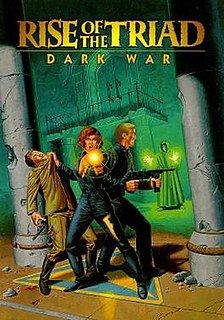
Rise of the Triad: Dark War is a first-person shooter video game, developed and published by Apogee Software in 1995. The player can choose one of five different characters to play as, each bearing unique attributes such as height, speed, and endurance. Its remake was designed by Interceptor Entertainment and released by Apogee Games in 2013. The shareware version of the game is titled Rise of the Triad: The HUNT Begins.
Shareware is a type of proprietary software which is initially shared by the owner for trial use at little or no cost with usually limited functionality or incomplete documentation but which can be upgraded upon payment. Shareware is often offered as a download from a website or on a compact disc included with a magazine. Shareware differs from freeware, which is fully-featured software distributed at no cost to the user but without source code being made available; and free and open-source software, in which the source code is freely available for anyone to inspect and alter.

Wolfenstein 3D is a first-person shooter video game developed by id Software and published by Apogee Software and FormGen. Originally released on May 5, 1992 for DOS, it was inspired by the 1981 Muse Software video game Castle Wolfenstein, and is the third installment in the Wolfenstein series. In Wolfenstein 3D, the player assumes the role of Allied spy William "B.J." Blazkowicz during World War II as he escapes from the Nazi German prison Castle Wolfenstein and carries out a series of crucial missions against the Nazis. The player traverses each of the game's levels to find an elevator to the next level or kill a final boss, fighting Nazi soldiers, dogs, and other enemies with knives and a variety of guns.
Commander Keen is a series of side-scrolling platform video games developed primarily by id Software. The series consists of six main episodes, a "lost" episode, and a final game; all but the final game were originally released for MS-DOS in 1990 and 1991, while the 2001 Commander Keen was released for the Game Boy Color. The series follows the eponymous Commander Keen, the secret identity of the eight-year-old genius Billy Blaze, as he defends the Earth and the galaxy from alien threats with his homemade spaceship, rayguns, and pogo stick. The first three episodes were developed by Ideas from the Deep, the precursor to id, and published by Apogee Software as the shareware title Commander Keen in Invasion of the Vorticons; the "lost" episode 3.5 Commander Keen in Keen Dreams was developed by id and published as a retail title by Softdisk; episodes four and five were released by Apogee as the shareware Commander Keen in Goodbye, Galaxy; and the simultaneously developed episode six was published in retail by FormGen as Commander Keen in Aliens Ate My Babysitter. Ten years later, a homage and sequel to the series was developed by David A. Palmer Productions and published by Activision as Commander Keen. Another game was announced in 2019 as under development by ZeniMax Online Studios, but was not released.

3D Realms Entertainment ApS is a video game publisher based in Aalborg, Denmark. Scott Miller founded the company in his parents' home in Garland, Texas (US) in 1987 as Apogee Software Productions, to release his game Kingdom of Kroz. In the late 1980s and early 1990s, the company popularized a distribution model where each game consists of three episodes, with the first given away free as shareware and the other two available for purchase. Duke Nukem was a major franchise created by Apogee to use this model, and Apogee published Commander Keen and Wolfenstein 3D the same way.

Catacomb 3-D is the third in the Catacomb series of video games, and the first of these games to feature 3D computer graphics. The game was originally published by Softdisk under the Gamer's Edge label, and is a first-person shooter with a dark fantasy setting. The player takes control of the high wizard Petton Everhail, descending into the catacombs of the Towne Cemetery to defeat the evil lich Nemesis and rescue his friend Grelminar.

Todd Jason Replogle is an American video game programmer best known as the co-creator of the Duke Nukem series. He wrote six 2D action games for MS-DOS released as shareware by Apogee Software between 1990 and 1993. This included Duke Nukem and Duke Nukem II, which were side-scrolling platform games.

Duke Nukem is a 1991 platform game developed and published by Apogee Software for MS-DOS. The 2D, multidirectional scrolling game follows the adventures of fictional character Duke Nukem. It consists of three episodes of ten levels each.
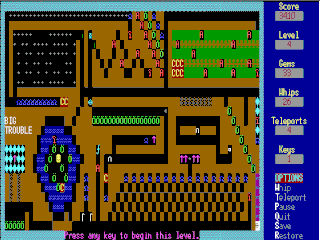
Kroz is a series of Roguelike video games created by Scott Miller for IBM PC compatibles. The first episode in the series, Kingdom of Kroz, was released in 1987 as Apogee Software's first game. It was also published on Big Blue Disk #20. Kroz introduced the scheme of the first episode being free and charging money for additional episodes; a technique which defined the business model for Apogee and was adopted by other MS-DOS shareware publishers.
Word Rescue is an educational platform MS-DOS game written by Karen Crowther (Chun) of Redwood Games and released by Apogee Software in March, 1992. It was re-released in 2015 for Steam with support for Windows and Mac OS. The game can also allow the player interact with a pair of Stereoscopic Vision Glasses.
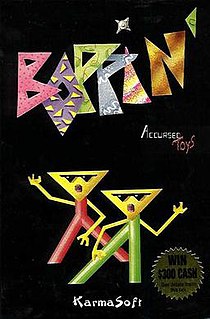
Boppin' is a puzzle-oriented video game created by Jennifer Diane Reitz in 1991, developed under the company name Accursed Toys and published by Karmasoft for the Amiga computer with only 32 colors on screen. Around that time Karmasoft held a level design contest. The game sold poorly with 284 copies, so Jennifer got it republished by Apogee Software with up to 256 colors on screen. Due to mature content containing blood and seppuku, the game was rated for players aged 25.

Math Rescue is a 1992 educational platform game created by Karen Crowther of Redwood Games and published by Apogee Software. Its early pre-release title was "Number Rescue". Released in October 1992 for the MS-DOS platform, it is a loose successor to the earlier game Word Rescue, whose game engine was used to power the new game with minor changes. Math Rescue was initially released as shareware but later achieved a retail release. It was followed by Math Rescue Plus. There were plans to have a sequel to the game called "Gruzzle Puzzles" but it was never started.
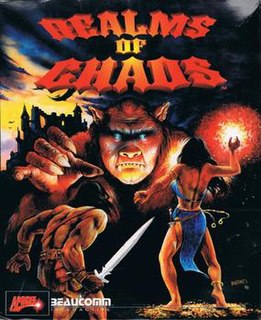
Realms of Chaos is a platform game written for DOS, published by Apogee Software as shareware. The game was authored by Keith Schuler, who had previously designed Paganitzu, and was originally to be a sequel entitled Alabama Smith and the Bloodfire Pendant. It is still sold by Apogee. Like previous platform Apogee games, this one utilized the FAST engine. The game was re-released in 2013 on GOG.com with support for Windows, macOS, and Linux.
Mountain King Studios is a computer game company located in Chicago, Illinois. It was founded by game programmer/game designer Scott Host. In addition to the development of Raptor: Call of the Shadows, Cygnus also collaborated with Apogee Software on a number of their games. Some members of the company split to form Rogue Entertainment, while the company itself was renamed "Mountain King Studios".

Commander Keen in Invasion of the Vorticons is a three-part episodic side-scrolling platform video game developed by Ideas from the Deep and published by Apogee Software in 1990 for MS-DOS. It is the first set of episodes of the Commander Keen series. The game follows the titular Commander Keen, an eight-year-old child genius, as he retrieves the stolen parts of his spaceship from the cities of Mars, prevents a recently arrived alien mothership from destroying landmarks on Earth, and hunts down the leader of the aliens, the Grand Intellect, on the alien home planet. The three episodes feature Keen running, jumping, and shooting through various levels while opposed by aliens, robots, and other hazards.

Commander Keen in Goodbye, Galaxy is a two-part episodic side-scrolling platform video game developed by id Software and published by Apogee Software in 1991 for DOS. It consists of the fifth and sixth episodes of the Commander Keen series, though they are numbered as the fourth and fifth, as Commander Keen in Keen Dreams is not part of the main continuity. The game follows the titular Commander Keen, an eight-year-old child genius, as he first journeys through the Shadowlands to rescue the Gnosticenes so they may ask the Oracle how the Shikadi plan to destroy the galaxy, and then through the Shikadi's Armageddon Machine to stop them. The two episodes feature Keen running, jumping, and shooting through various levels while opposed by aliens, robots, and other hazards.
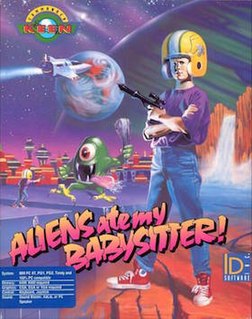
Commander Keen in Aliens Ate My Babysitter is a side-scrolling platform video game developed by id Software and published by FormGen in December 1991 for DOS. It is the seventh episode of the Commander Keen series, though it is numbered as the sixth, as Commander Keen in Keen Dreams is outside of the main continuity. The game follows the titular Commander Keen, an eight-year-old child genius, as he journeys through an alien world to rescue his kidnapped babysitter. The game feature Keen running, jumping, and shooting through various levels while opposed by aliens, robots, and other hazards.













